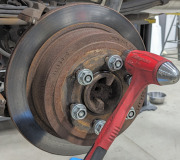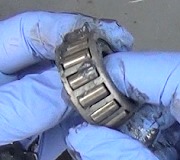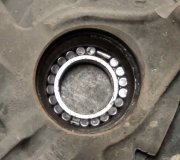There are two sides to every story. Having said that but not knowing how he conducts business, I can only offer some insights. I do empathyze with your feelings, as I often do with our own customers.
Flat out, I don't back a brake job when I turn rotors unless there is significant meat on them. That's rare. The rotors have been made thinner to reduce vehicle weight to meet the EPA guidlines. So you get more fuel mileage and more expensive repairs.
I don't know if this points to a faulty job as much as it may point to a faulty industry. For a moment look at it from a shop's perspective. We face competition that offers $80 brake jobs. Folks see this and assume that all brake jobs are equal. Try to explain this to someone that throws up a mental wall because they are technically challenged or won't take the time to ask questions to fully understand, but nod their head pretending to understand makes for frustration. They get sucked in the door by this advertising, never to fully realize the "big savings". So as a shop, you want to remain competitive and may offer to turn the rotors or offer economy pads or what ever to land the job. Which is all fine as long as the customer knows what they are getting and why you wouldn't recommend it that way. Communication is very important. If you were warned about turning the rotors and the pitfalls associated with that, than the mechanic is not to blame. However, some still believe this is a normal and acceptable method. And still don't measure them before of after machining. In that scenario, I would be very concerned of thier competence. If they are willing to back up this up and end up eating jobs from trying to save the customer money by old school methods, both the shop and consumer will lose.
As repairs shops we are constantly faced with keeping up with technology at a great cost, keeping employees that come at a great cost, paying for information that is still lacking not to mention the need for new tools along the way. This creates a necessity of expensive repairs for the consumers.
I would try to avoid confrontation, aggression and accusitory comments when trying to get a resolution. You can help lead him to a conclusion or at least open the door to a rationalized logic. There is nothing wrong with asking why the rotors are pulsating after doing the brakes.(How many miles ago?) OF course we are making the assumption that this is what is happening and he has already verified this. Where this becomes a little muddied is "what is fair?" Were new rotors offered? How many miles since brake job, Perhaps meeting in the middle may be fair, He covers the labor, you pay for the parts that hw is providing. Depending on circumstances, he may cover it all or none of it. Not all shops go by the same warranties, policies or care of other ones. We often deal with problems on a case by case resolution with general guidlines. We take care of things that we really shouldn't have to, but also see it from the consumer's perception as well.
IF you can't communicate clearly with them, it may be best to move on. There are so many times that something happens that makes the shop look bad that only good communication can help the relationship of the shop and customer survive. There are unrealistic expectations from repairs shops by consumers at times as well quick to judge thinking. Conversley there are shops who abuse customers as well. A site like this can help both the shop and you.
There are times that we can get only so far with a diagnosis and can not give a guarentee that there are no other problems. The car is no longer new, but being driven and multple problems can be present. We can go to extremes to try to confirm somthing, only to find that the information we are working with is wrong or unclear. Where it becomes important is to give the car owner the choice of what path to take after explaing them. "I can save you some money by maching the rotors. However, the potential of them warping are considerably more. They could appear immediatly or in a year from now, maybe never. The cost difference is $X to replace the rotors, and I can back this with a warranty of."
I know I got off onto a tangent, but hope this helped, I would be glad to discuss this as far as you like.
SPONSORED LINKS
Friday, May 11th, 2007 AT 9:13 PM




